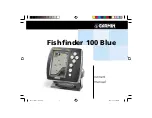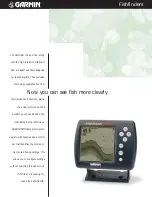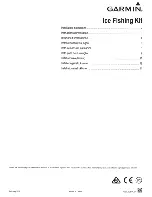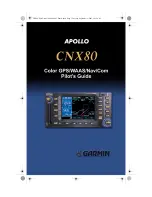
Glossary
GPS & Navigation Terms
26
Present Position:
Present Position is the current location (latitude, longitude)
determined by GPS. The Present Position is indicated on-screen by a directional
boat icon if the boat is moving, or a round symbol if the boat is stationary.
Route:
A Route is series of waypoints linked together in a specific sequence to
define a navigation path between two points, and saved in the fishfinder’s
memory. Routes are often used when frequently traveling between two or more
locations because it is a faster and more accurate method than repeatedly
selecting individual waypoints each time one travels through the same area.
Routes consist of a Start Waypoint, an End Waypoint, and a series of waypoints
in between. Users can begin navigation at the beginning, the end (to run the
route in reverse) or at any waypoint in between. See
Waypoint
.
SD:
SD is an acronym for Secure Digital. An SD card is virtually identical in
function to an MMC; however, the speed at which information can be accessed
is generally faster, the storage capacity is generally larger, and the card has
security features which can be used to prevent extracting the data from the card.
SD is the same format that many digital cameras use. See
MMC
.
Selective Availability:
Selective Availability (SA) is a GPS system “feature” that
can be implemented by the U.S. Department of Defense (DoD) to degrade the
accuracy of GPS positioning information. With SA active, the GPS is accurate to
within 100 meters 95% of the time. With SA inactive, the GPS is accurate to
within 45 meters 95% of the time. Currently, SA is inactive and the consumer can
enjoy the greater precision GPS provides; however, the DoD reserves the right to
activate SA at any time.
Speed Over Ground (SOG):
Speed Over Ground is the measurement of the
boat’s progress across a given distance, and is the speed measurement provided
by GPS. An alternate, Speed Through Water, is provided by a speed
paddlewheel, and is the measurement of the flow past the boat, which may vary
depending on current speed and direction. Speed Over Ground is optimal for
navigation because accurate destination times can be derived from this
measurement. Humminbird
®
products allow for input and display of both speed
measurements.
Time To Go (TTG):
Time To Go is the estimated time required to reach the
destination waypoint. TTG is calculated using the SOG and DTG. See
SOG
and
DTG
.
Track:
A Track is a series of saved points that define the past path of the boat.
These Track Points are saved at regular time intervals. Tracks are a useful and
quick method to see where you’ve been, and an easy guide to follow to get you
back to the starting point. Generally, all GPS units have a limited number of Track
Points that can be saved before the unit runs out of memory and begins erasing
the first track points saved. Because of this, the user can adjust the Track Point
Interval menu to increase the amount of time between when points are saved,
and thus extend the distance covered by a track. Tracks can also be permanently
saved to memory, and re-displayed at the user’s option.
Track Line (TRK):
The Track Line is the desired line of travel between two
waypoints, and represents the most efficient path between the two points
because it is a straight line. The TRK is measured in degrees (i.e. 321°, where
000° is North, 090° East, 180° is South, 270° is West). See
Cross Track Error
and
Course Over Ground
.
Trackplotter:
Trackplotter describes a navigation device that shows Present
Position, along with Track, Waypoint, and Routes, but NO MAP in the
background. See
Chartplotter
.
531598-1_A - PlatCart_Man.qxp 4/11/2007 8:27 AM Page 26






















